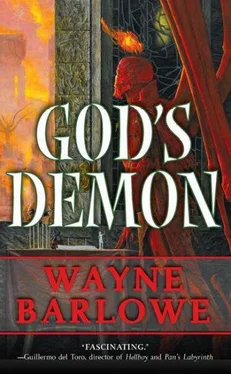Wayne Barlowe
GOD’S DEMON

“Is this the Region, this the Soil, the Clime,”
Said then the Lost Archangel, “this the seat
That we must change for Heav’n, this mournful gloom
For that celestial light?”
—John Milton,
Paradise Lost
Paradise Lost
Awake, arise, or be for ever fall’n.
—John Milton,
Paradise Lost
Ash fell from a sky of umber darkness, softening the jagged chaos of the world below his open window. It obscured his vision so that he could barely discern the distant, broken towers he knew to be there. Only the star Algol, ever burning, ever watchful, managed to pierce the dark clouds and tint his room with a subtle ruddy glow. Eligor sat motionless, as he could for hours, watching the flakes drift down, and thought it fitting that they should come so heavily. He watched the tiny laborers far below, as they tirelessly rebuilt the shattered city of Adamantinarx. The ash fell peacefully; no burning wind played upon its slow descent and so Eligor could write without having to clear his desk every few minutes.
He wrote in ferocious bursts, punctuated only by his countless interviews and his moments of reverie. He wrote because he felt that he had to, and when he wrote it was in the script of angels. Because now it was permitted. The script had come fitfully, at first; it had been so long since he had written in it. The long strokes of his precious quill pen had been just a little too precise, the terminating circles a little too crabbed. But eventually he loosened up, remembering his way, and the letters flew from his pen like lightning. Soon the events of the not-so-distant past were flowing freely and the story of the last days of his lord, Sargatanas, took shape.
Eligor barely remembered the flight from the battlefield back to the palace. He had only the vague impression of passing through the shredded clouds of war with his troops, an elite squadron of Flying Guards, and of being so weary that he could barely stay aloft. There was too much to say between them, and therefore no one said anything.
Beneath him the clouds had parted to reveal the dark landscape. From their altitude the world looked as it always had. Vast olive-brown plains, like sheets of skin, rended and folded, were cut by flowing, incandescent rivers of lava and pocked by scattered outposts, pincushioned with fiery-tipped towers. The fires of Hell still blazed, at least, and Eligor had tried to convince himself that all was as it had been.
On they flew, their spirits beginning to lift, but when they entered Sargatanas’ wards all their fantasies vanished. There were virtually no intact buildings to be seen, so complete had been the need for the city’s bricks, for its souls. Where once had been laid out a vast and bustling city there now was a dismal grid of tumbled blocks and foundations. Like some newly excavated ruin, the city of Adamantinarx lay exposed and broken, its empty streets only discernible with the greatest effort. Colossal statues stood tilted upon pillaged pedestals, ornamental columns were strewn like broken bones across avenues, and the once-active river harbor was submerged for many blocks in the absence of its former embankment.
Sargatanas’ palace had fared little better. Looming up from the mount in the city’s center, it looked dark and ominous. The immense, domed building was pierced in a thousand places, its walls ravaged for their bricks, allowing the wind, cinders, and ash to move freely within. Eligor closed his eyes when he first saw the palace. Here was the home of his lord, abandoned and subject to the fury of Hell’s fierce elements. Empty.
Eligor and his traveling companions alighted upon the rim of the dome’s oculus and, wings folded, peered down into the once-great Audience Chamber. Nothing could be seen.
They descended into the darkness, silently. As they dropped down, the only light came from the fires guttering atop the Guards’ heads, reflected as tiny pinpricks of flame that gleamed back from the innumerable distant gold columns that ringed the space. It took many minutes to fall to the floor and, once there, many more for them to cross the space to the exit, so great was the chamber’s size. In the flickering flame-light they could see only portions of the silver-white sigil—his sigil—that was inlaid into the soot-covered floor. Sorrow once again washed over them as they looked at one another.
The party entered the wide corridors, and here the pierced walls allowed enough light from outside to penetrate, creating an irregular patchwork across the floor. Their muffled footsteps echoed around them as they walked away from the Audience Chamber. They did not bother to light the torches that lined the walls, mostly because to do so would reveal even more of the disarray. The sighing wind from outside, they agreed, would have extinguished them anyway.
They picked their way through the palace, stepping around tipped-over cases, torn tapestries, smashed friezes and tiles, and the rich furnishings that had given their lord his little pleasure. All were covered in mounds of ash, which, when kicked up, suffused the hallways with a dense, choking fog.
Eligor was the first to enter the Library and all could hear his sharp intake of breath upon seeing the devastation. He had spent so much of his time there, most of it with his lord. They wended their way through the giant piles of enormous, heavy books pulled from the shelves and left in moldering tumuli. The wind whistled over them, rustling the pages back and forth, blowing ash and bits of parchment in small whirlwinds around them like swirling motes of memories.
Eventually the party split up. One by one each Flying Guardsdemon broke away to descend deeper, on his own, into the palace, seeking their chambers and, perhaps, their lost purpose. Eligor wondered what they must have thought upon reaching their rooms, each finding his own personal chaos.
After clearing away a mound of debris, Eligor entered his own chambers, high atop the main tower, and found them to be ankle deep in ash. His desk, still firmly growing from the floor, was an island in a sea of cinders. His books and papers were barely visible, scattered on the floor by the winds that came freely in through a new and gaping hole in the wall. Oddly, the obsidian-glassed window was intact, banging open and closed in the same hot wind. He pulled it shut and latched it, feeling odd that this was his first act upon entering his personal world. The hole yawned just next to the window and he stood at its verge, his cloaks and folded wings flapping, looking down at the ground so far below. He would begin the reconstruction of his life immediately, fill the hole, clear the floor, tidy the shelves, and set his desk in order. He had a mission now. He had to reveal everything. He had to tell his lord’s story.
ADAMANTINARX-UPON-THE-ACHERON
There was the Fall. And no one was permitted to speak of it, or of the time before or of the Above. But it was the Fall that established many things in Hell, not the least of which was the distribution of territory. The future wards of Hell were randomly determined as each Demon Major, on his own sizzling trajectory from the Above, plunged headlong, meteoric, into the unknown wilds of the Inferno. Some impacted far apart, setting up their realms in relative seclusion and safety, while others, less fortunate, found themselves in close proximity, able to see the rising smoke of their neighbor’s arrival. These close arrivals began plotting and campaigning as soon as they could gather about them enough minor demons to form a court. The fratricidal wars that erupted lingered for millennia, occasionally flaring up into major conflagrations. These were the volatile times of Settlement and they were never forgotten by the survivors. Many of Lucifer’s original Host were lost, but those that remained, the strong and the cunning, established powerful kingdoms that would grow and prosper.
Читать дальше













